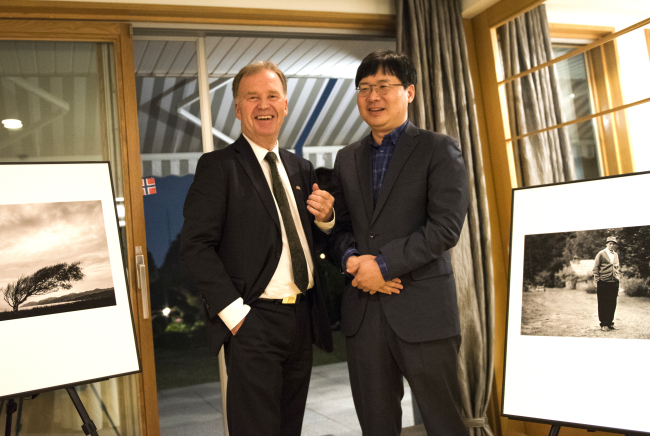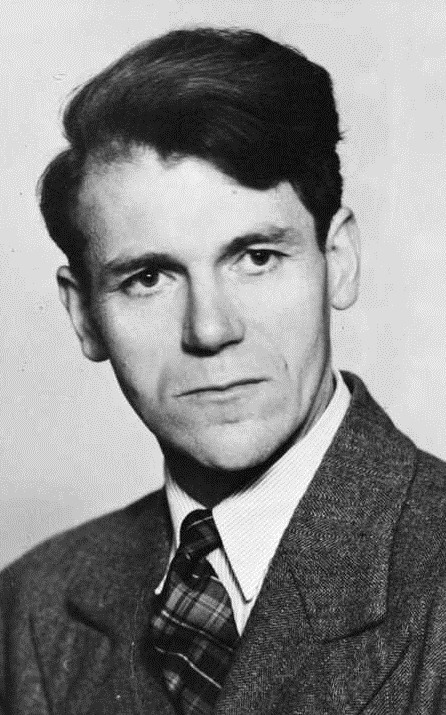Norwegian poems vivify long lost senses
“As there are no clear answers in art, a world full of explanations would be deprived of our imagination and curiosity.”
By Korea HeraldPublished : May 1, 2017 - 17:17
The Norwegian Embassy held a book launch event last week that featured the celebrated works of Olav H. Hauge (1908-94), a distinguished poet famous for his realistic portrayal of natural and sentient beings.
A collection of his poems has been recently translated into Korean by professor and poet Lim Sun-ki, who teaches at Yonsei University’s Department of French Language and Literature. The translation was financially supported by the embassy and published by Bomnal Books.
Professors, poets, journalists and publishers attended the event at the diplomatic compound in Seoul, where Lim read out Hauge’s renowned poems in Norwegian and Korean, and musical pieces of Norwegian composer Edvard Grieg were played.
“Hosting this event is a great privilege to me, as we celebrate the work of one of the finest Norwegian poets that ever lived,” Norwegian Ambassador to Korea Jan Grevstad said in a speech.
A collection of his poems has been recently translated into Korean by professor and poet Lim Sun-ki, who teaches at Yonsei University’s Department of French Language and Literature. The translation was financially supported by the embassy and published by Bomnal Books.
Professors, poets, journalists and publishers attended the event at the diplomatic compound in Seoul, where Lim read out Hauge’s renowned poems in Norwegian and Korean, and musical pieces of Norwegian composer Edvard Grieg were played.
“Hosting this event is a great privilege to me, as we celebrate the work of one of the finest Norwegian poets that ever lived,” Norwegian Ambassador to Korea Jan Grevstad said in a speech.

“Olav Hauge offered very few answers in his poetry except contemplation. I don’t think his compositions would have touched so many souls if filled with convictions. As there are no clear answers in art, a world full of explanations would be deprived of our imagination and curiosity.”
Hauge was known for his modernist approach in his late career, using heavy references to nature and its phenomena as a tool of expressing human emotions. Born and raised on a small farm on a fjord hillside in western Norway, the poet spent most of his life in the rugged mountains, which consequently shaped his writing.
The writer also introduced and popularized a strand of poetry known as concrete poetry -- “nynorsk” in Norwegian -- that influenced later lyricists.
“Despite being separated by more than two generations of time, Hauge is alive in our lives, particularly mine,” said Lim, who translated 30 of his poems.

“His verses speak of things like bread tidbits offered by a homeless man to hungry birds in winter, the sound of waves in the treacherous sea below eagles hunting for prey, the bountiful microcosm of biology on the floor of freshly cut trees and the mind of an eagle descending down a steep fjord.”
In addition, the Norwegian embodied and championed the Nordic values of humanism, egalitarianism, environmentalism, minimalism and public confidence, the professor expounded.
“As a gardener of imagination, Hauge brought to life the infinite possibilities of our universe by vignetting overlooked trivialities around our lives,” Lim said, adding his minimalistic simplicity was also influenced by Asian poetry.
Hauge is known to have been inspired by classical Chinese poetry, as evident in his poem “Tao Chein” in the “Spor Vinden (Ask the Wind)” collection. His works were adapted into English by Scottish poet Robin Fulton and American poet Robert Bly from the late 1980s to early ’90s.
By Joel Lee (joel@heraldcorp.com)
-
Articles by Korea Herald




![[Herald Interview] 'Amid aging population, Korea to invite more young professionals from overseas'](http://res.heraldm.com/phpwas/restmb_idxmake.php?idx=644&simg=/content/image/2024/04/24/20240424050844_0.jpg&u=20240424200058)












![[KH Explains] Korean shipbuilding stocks rally: Real growth or bubble?](http://res.heraldm.com/phpwas/restmb_idxmake.php?idx=652&simg=/content/image/2024/04/25/20240425050656_0.jpg&u=)

